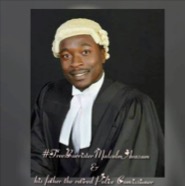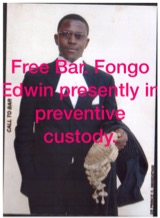“You cannot carry out fundamental changes without a certain amount of madness.”
Posted 4 August 2017
“THE FIGHT FOR JUSTICE.
Many years ago, I took an oath before a panel of justices, a college of learned advocates and the general public to defend and safeguard the rights of citizens in the public. It was an oath to defend the voiceless and bring justice to them.
(…)
Today, fellow Cameroonians have been illegally arrested, maimed, raped, incarcerated and killed for asserting their rights to self determination, denouncing extra-judicial killings, corruption, bribery and the non respect for the rule of law. What are we doing to shine light on these abuses? When the history of this country would be written; what will be your legacy for posterity? I have chosen the path of social justice.”
Posted 8 February 2018
This is the voice of human rights advocate and activist P. Yenkong. He is active as a lawyer and is founder of the organization Settlement House for Dispute Resolution and Reconciliation (SHDRR) based in Bamenda providing free legal services to indigent litigants in the North West region of Cameroon. His online posts are a story his experiences as an involved lawyer and citizen of his country. [1]
It started with the strike of the Anglophone Common Lawyers in June 2016 in Buea, fighting against the imposition of Francophone laws, followed by teachers’ and students’ demonstrations sympathizing with the demands of the lawyers and requesting change of the educational system. Years of neglect and oppression by the French speaking establishment and feelings of marginalization of this part of the country resulted in accumulated and deeply rooted anger and frustration. These sentiments that have been present mostly under the surface for centuries have now led to widely supported protests and a desire to peacefully fight the system and change their predicaments. However, the situation escalated and the protestors were met with brutal violence by security forces. On the 10 November 2016 in Buea, several protesting lawyers were beaten and disposed of their wigs and gowns. Soon after, also images and videos of students in their residential areas being attacked by security forces with water canons, beaten and humiliated, circulated on social media. In the same month, a student in Bamenda was killed in clashes with the police. The Cameroon Anglophone Civil Society Consortium (CACSC) called for ‘Ghost Towns’, asking citizens to withdraw from any public activity.

 Lawyers protesting in Buea. Source: Facebook.
Lawyers protesting in Buea. Source: Facebook.
Silenced voices
Bibixy Mancho, a newscaster of a local radio station and ‘the freedom fighter’ as he calls himself, appeared standing in a coffin that he had tied up to a car speaking to a crowd on the main street in Bamenda on 21st November 2016. The next day he had spread an audio recording on social media inviting other citizens to join the fight. He became a symbol of resistance and protest in the uprising that had started from that moment. On January 19 2017 he was arrested and brought to the capital Yaoundé.
“The courage, resilience and determination of Bibixy Mancho and other human rights activists in pre-trial custody and the consciousness they have garnered within Cameroon and abroad has brought us to the awareness that critical voices cannot be silenced.
(…)
“These gentlemen walked the non-violent path of human rights. Their arrest and excessive detention period exposes the deep flaws in our country’s justice system and calls to mind several unanswered questions. Many, including myself are tempted to believe that our judges who are supposed to dispense justice based on the law and their consciences are otherwise acting on instructions from the very top of government.
(…)
There is a school of thought to the effect that the continuous incarceration of Bibixy Mancho and others might have fuelled a cycle of resistance that drives other Cameroonians to speak truth to power.”
Posted 1 March 2018

Bibixy Mancho launches the so-called “Coffin Revolution” in the heart of Bamenda. Source: Whatsapp.
Not only the voices of public figures are silenced. Oppression of the people in Western Cameroon by the government takes yet another form in the several Internet shut downs. In attempt to quell criticism also the average citizen is limited in his communication. April 20 2017 marked a cut off of 94 days. Another Internet shutdown would follow in November lasting for more than a month. However, it would not be the last one. On the ground, house-searches and arrests took place whereby mobile phones were confiscated and screened for images that would show the strike actions, the unrest and violence of policemen and soldiers.
Online Protests
“Brother Malcolm! Freedom doesn’t come to you; you fight for it! How relevant is this to fellow Ambazonians?”
Posted on 25 august 2017
‘Ambazonia’ refers to the land of Southern Cameroons that was administrated as a United Nations trust territory under British administration (1946-1961) and is used by separatists who advocate for the secession of Southern Cameroons from the Republic of Cameroon to form an independent, sovereign nation. The name ‘Ambazonia’ comes from the Ambas Bay which is located in Southwestern Cameroon and used to be the home for a settlement for freed slaves founded by the British missionary Alfred Saker in 1858.
Over the past months lawyers and activists have been arrested by the Cameroonian government and detained to try silence their voices. As the demonstrators are violently suppressed, people have united and organized themselves on the Internet to seek for justice. On social media platforms like Facebook and WhatsApp campaigns are held to free journalists and lawyers. They demand an end to discrimination by the French speaking majority, as the Anglophone Cameroonians frame it. In a post P. Yenkong says:
“Another lawyer again??? This is simply outrageous and a calculated attempt by the Cameroonian government to silence dissent.”

Posted 12 February 2018
Control posts and arrests on the roads from South to North:

“LETS JOIN HANDS AND FREE BARRISTER FONGO EDWIN! 🙏 🙏 🙏 ✍ ✍ ✍
The Settlement House for Dispute Resolution and Reconciliation (SHDRR) is dismayed and appalled by the arrest and detention of Barrister Fongwo Edwin, a seasoned human rights defender and civic leader. Barrister Fongwo was on his way to Bamenda from Yaounde on the 20th of September 2017, when security officials abducted him and subsequently detained him at the gendarmerie up station in Bamenda and later transferred to Yaoundé.
The arrest of Barrister Fongo Edwin comes against a background where the state has launched a series of arrests on human rights defenders. From January 2017, to date, the courts have been inundated with cases where several human rights activists have faced trumped up charges including “acts of terrorism”, “inciting violence” “public nuisance” among other charges.
SHDRR notes that the arrest of Barrister Fongo Edwin presents the height of the state’s relentless target of human rights defenders that is meant to silence and cower citizens from exercising their fundamental human rights that are enshrined in the constitution, domestic and international human rights laws that the Cameroon government has duly ratified.
(…)
Furthermore, it is an outrage that lawyers perceived in society as the voice of the voiceless have been reduced to cheap criminals that cannot travel safely in a bus talk less answer a telephone call for fear of being arrested! Any right thinking Cameroonian who doesn’t speak out against the excesses of the regime is either a coward, ignorant or eating from the table of the government of Cameroon.
The Cameroon government is abusing its power, deliberately making the country a dangerous place for people who have been peacefully carrying out activities to promote and protect human rights and\ or peacefully exercising their right to freedom of expression, opinion or belief, assembly and association.
On this note, we are counting on the international community to condemn, in the strongest possible terms the current crackdown on human rights in Cameroon and advocate for the immediate release of all prisoners of conscience languishing in preventive custody.”
Posted 26 September 2017
Hardship in prison:
“CAN YOU HELP MY DAD IN PRISON?”
Govi says when he was arrested, he was subjected to egregious forms of human rights violation. Little did he know his arrest would culminate into a harbinger of events that would eventually kill him a million times before his real death.
(…)
According to prison records, Govi will be appearing in court for the 196th time. His case in prison is not unique. There are several cases of innocent Cameroonian’s languishing in our prisons. This is a clarion call to all rights advocates who emit empathy for the plight of the voiceless to stand up and ensure that their voices be heard.
Govi’s family needs my voice; your voice to put an end to Cameroonian’s enduring unspeakable suffering in our jails and prisons.
On behalf of SHDRR and other SHDRR partners, we wish to thank heartily for continuing to stand with us in the fight against injustice.
God bless you.
Pangmashi E.N Yenkong DRS”
Posted on 12 August 2015
Bridges:
“Stop instilling fear on the valiant sons and daughters of Ambazonia for seeking their rights to self determination. Presently, there is a carnage going on in the North West and South West regions of Cameroon. How can we dialogue with the perpetrators of injustice? Let the government of La Republique du Cameroon be mindful of the fact that Southern Cameroonians have burnt their bridges. We don’t have guns, tear gas or ammunitions to fight; but our resilience, determination and dedication will see us through.”
Posted 9 October 2017
Where is the International community?
While the international community barely reports about the crisis unfold in Cameroon since 2016 Cameroonians in the diaspora are speaking out by organizing demonstrations in front of the headquarters of the United Nations in New York, Washington D.C. and Cleveland, and others protesting at the French and Cameroonian consulates and embassies in Cape Town, France, Germany and the Netherlands.
“It is terrible how we have suddenly lost our voices in the face of tyranny and gross misconduct. How long shall we continue to make excuses for the sheer failure of President Paul Biya’s continuous stay in power? Our voices have been suppressed. The government of La Republique has applied draconian measures to compel our people to accept the present status quo. Is the world witnessing this carnage going on in the Southern Cameroons? Where is the respect for domestic and international humanitarian law?
The inability of the Nigerian government to make a comprehensive public statement on the matter pertaining to the illegal abduction of our leaders portray the Federal government of Nigeria in very bad light. That an abduction occurred in Federal Capital territory, the seat of power without an official explanation, portray a negative image of the federal government, it’s security and intelligence network with a mission to provide security to Nigerians and persons on the territory of Nigeria. Contrary to what many may believe, the Southern Cameroons National Council SCNC-MORISC are fighting for survival from an oppressive regime in power. We are an independent nation trying to regain our sovereignty from the claws of an oppressive regime that is desperately trying to recolonize us.
There is a lot to talk about the fate of our “missing leaders”; but one thing is certain the steps to democratize Cameroon or restore the independence of the Southern Cameroons cannot be determined by the International Community, nor the African Union but by the Cameroonian people.”
Posted 30 January 2018
“Patricia Scotland Q.C fell short of expectations during her visit to Cameroon. [2] How worthy is the International Community’s influence pertaining to the current impasse in Cameroon?”
Posted 20 December 2017
The violence has intensified and citizens feel threatened. Fear and insecurity prevail because of the lack of information and unpredictable situations. A number of armed separatist groups, among them the so-called ‘Amba Tigers’, have invaded and razed villages in rural areas in Anglophone Cameroon.
Many people have already fled to neighboring country Nigeria to seek refugee. In January 2018 the president of the interim government of Ambazonia Julius Ayuk Tabe was arrested together with other officials in Abuja, Nigeria, and later extradited to the capital of Cameroon. Tensions are rising.
It does not stop activist P. Yenkong from forcing the conversation to continue and move people to peaceful action. As for example news channel BBC says (24 March 2018) it has been denied access to the regions affected to report about the crisis it becomes clear how voices of people like P. Yenkong are very important. He takes his examples from men who have been at the forefront of change:
“EVERY MAN OF HUMANE CONVICTION MUST DECIDE ON THE PROTEST THAT BEST SUITS HIS CONVICTIONS, BUT WE MUST ALL PROTEST.
Martin Luther King Jr”
Posted on 26 February 2018
And as he cited Sankara, a certain amount of madness, nonconformity, and courage to turn your back to old ways of doing, with his voices who carries many other voices, he tries to change the future of the Anglophone regions in Cameroon. Will they succeed?





